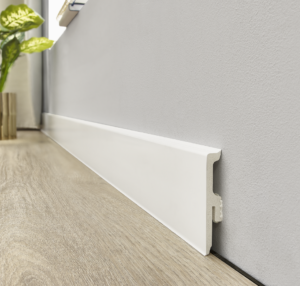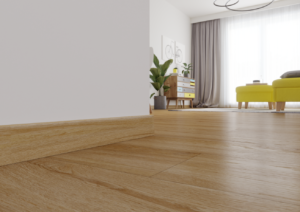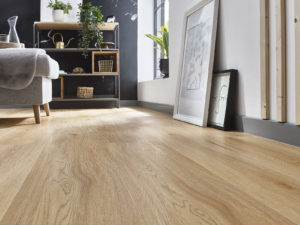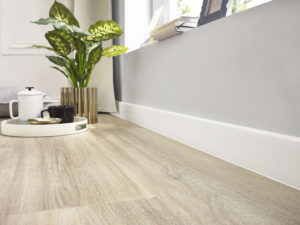The floor is the largest when it comes to covered area element of a home. It is not only up to floor planks itself to create the beautiful environment but well matched accessories can make a difference. Choice of the skirting boards in many cases can be done at the final stage of renovation or finishing apartment and hence can be overlooked. In the meantime, skirting boards has not only aesthetical purpose, but also important functional meaning. Its quality, durability and appearance can make or break to final outcome of interior. Well suited skirting will allow to emphasize the qualities of even the most beautiful floor. On the other hand, wrong skirting can optically reduce the size of the room or disturb its proportions. So what you should take into account while choosing skirting boards?
Are skirting boards a must?

Skirting boards are used to cover the dilatation gap at the junction of floor and wall. For a floating floor to perform at its best it is necessary to leave a space for a planks to expand in response to temperature changes. This gap protects the floor from bending, releasing of locking system or even destroying it entirely. Skirting board will perfectly hide those gaps and complement entire composition of interior. Well-chosen skirting board will not only hide all of those gaps and untidiness but will make perfect transition between floor and wall. First the width of the gaps depends on materials that floor is made from, on the other hand skills of installer have an impact on installation precision. Majority of producers of vinyl click floors advice to keep 5 mm dilatation gap, but it is hard to keep those precise spacing and to find that skilled installer. So it is safe to pick a skirting boards will dilatation covering at least 1 cm. When it comes to finishing laminate floors skirting boards should be wider as producers of this type of floor recommend to keep 10 mm gap between floor and wall. So the ideal skirting for this application should have around 15-20 mm thickness. There are skirting boards that can cover event up to 26 mm which can be handy especially in case of mistake.
Beside obvious purposes that we have covered above, skirting boards have important functional goal. They protect the wall from accidental damages that can occur while vacuuming or from soiling with the shoes or a mop. Skirting boards can absorb hits and protect the wall in the places most exposed to damages – close to the floor.
How to choose a skirting board to make it look beautiful?
The rule that is safe to follow stands that skirting boards should be matched with the floor. Especially when it comes to performance features and usability factors. When you decide to use the skirting from the offer of the floor producer, you gain certainty that skirting will match floor in terms of a colour. Deciding on the company with great experience in skirting production, usually there is more colours to choose from and product has better technical parameters.
At first, colour
First factor that is being considered is colour of skirting. Two of the most popular strategies to choose skirting are to pick a skirting matched with structure, colour, wood graining to the flooring or to match with other interior elements like window or door frame. In this case the most popular choice is to pick the white shade. With skirting you can play with the interior – skirting boards matched to floor will make space appear to be bigger, but high, contrasting colour boards would optically shrink the wall. Here are three solutions of colour matching of the skirting.
Matching skirting to the floor colour
There are multiple options to choose from. The good, safe choice are skirtings from the producers of the floor itself. With high probability you can assume that floor and skirting will have ideally matched shade and structure. If you have a bright floor, as a side effect room would appear to be bigger with a matched skirting. This way of choice is really popular and safe. You will get classical and coherent interior that would suit majority of your guests. Good choice would be also application of universal skirting which has two principal advantages: it is cheaper and widely available in many shops.

Among wide range of skirting boards offering, there is a segment of “perfect match” skirting. They are adjusted by producer both in shade and character. Colours of skirting is achieved by the same process as for floor (f.e. laminating foil on the core of a skirting) or by high resolution digital printing. The good example of this process is TORE skirting from ARBITON, which has the same colour as their floor achieved by HD piezoelectric UV digital printing technology. Second type of skirting are “matched” skirting. They are also selected by producer to match first and foremost colour. Both categories guarantees ideal adjustment to floor. The only flaw of this solution is availability – most often they are available after order. It is worth remembering that its availability can be limited temporarily with particular colour of floor and might be at some point discontinued. So if you would like after few years make renovation it might not be available anymore.
At last there are also universal skirtings. They are the most popular solution. Wide colour range is adequate for the most popular colours in range across many producers. They can be easily selected in store just by putting next to the floor as they are widely available. Thanks to many colours is it very easy to find skirting for most of floors. The unquestionable advantage is their universal availability.
Matching skirting to the colour of a wall.
We are observing increasing popularity of blending skirting into the wall, when colour of the skirting is coherent with colour of the wall. The other solution is to create highly contrasting effect by combining different colours of skirting and wall making the skirting “pop”. It is very pleasing combination when put together white skirting with dark wall, but it is also possible to reverse the colours and attach dark or anthracite skirting to white wall. Both of those solutions have modern look in them but require carefulness while designing and experience in installing.
Matching skirting to the door frame, door panels or cabinets fronts.

It is more and more popular solution to achieve unified vertical surfaces of interior. This creates harmonized structure of walls. But it is crucial to pay attention to colours as each producer may have slightly different shade so even something as simple as white skirting can vary from one to another. Currently the most popular solution is to determine colours by the RAL palette. So a white skirtings in this system would be depicted by code RAL 9003. So when comparing shapes, width, length between different producers there is greater chance of choosing the same colour when RAL code is given. Since last year there are more designs of interiors using different shades of grey for doors and matching them with skirtings – the two most popular are RAL 7035 and RAL 7042.
Secondly, hight and material of skirting board
As a rule stand, high skirting boards (8 cm and higher) are used for interiors above 260 cm. When looking for a skirting boards for typical family home or attic it worth considering 6-8 cm skirtings.
Low profile skirtings have 4-5 cm in height. It can be simple quarter round skirtings or short plinth. The low hight makes them perfect for blending with the floor. They can be perfect for small rooms so they actually appear bigger. Main drawback is a minor change on visual reception of interior and low functional properties. 4 cm in height very often is too little to protect wall from f.e. bump of a vacuum cleaner.
Skirting boards 6-8 cm in height are the most popular and typical solution. They can be used in almost every room. This height will keep natural proportions of the room.
Skirting boards above 10 cm – it is suited for the rooms above 280 cm. A bit extravagant and flashy. In traditional interiors can disturb natural proportions and make a room seems smaller. But when consciously used they might be an additional asset to holistic interior design.
When it comes to materials that skirting boards are made from there is plenty to choose from. There are solid wood or MDF skirtings, non-PVC and universal PVC skirtings up to hybrid skirtings.
Solid wood skirting boards can be painted or lacquered or veneered (thin layers of wood used also for cabinet fronts). The look of those skirting is elegant but they lack in practicality. Wooden skirting are not the best match for vinyl floors as they can absorb water leading to the damages.
MDF skirtings (made from woodfiber boards) also can be finished with lacquer, veneered or coated with paper. The advantages of them are wide availability and great selection of patterns. The surface of those skirtings are resistant to mechanical damage, but not completely resistant to moisture. After only a few months of being in the room cleaned with a mop, they can swell with moisture, delaminate and crack. Another thing is assembly. They require practice when finishing corners – the necessity to make precise cuts at an angle of 45 degrees and very time-consuming silicon at the wall.
Metal skirtings are made of aluminium or stainless steel. They look modern, but it is not a popular solution, mainly due to the price and controversial design.
Traditional plastic skirting boards are cheap, waterproof, but often the visible mounting channel or protruding corners are visually disturbing. For vinyl panels, we can choose a skirting boards made of non-PVC material, eg VIDELIT. Videlit is an ecological material with special functional properties like water resistance and resistance to mechanical damage. Hybrid technology skirting boards are also a good solution, as they look beautiful and are completely waterproof at the same time. These skirtings are also highly resistant to mechanical damage.
Third, bet on waterproof
If our floor is waterproof, i.e. it is made of vinyl or laminated panels with increased resistance to moisture – the skirting boards should also be waterproof. This is an important principle worth following. Manufacturers offer a lot of waterproof skirting boards.
The latest proposal from the ARBITON brand is the TORE hybrid skirting board, which is available in two heights (6 cm and 8 cm). It is distinguished by a unique shape and smooth matte surface. TORE combines flexibility and water resistance (which characterizes PVC skirtings) with the appearance of the coating of varnished skirtings. High-resolution UV piezoelectric digital printing technology ensures perfect colour reproduction and high repeatability between production batches. Thanks to this technology, the colour of the skirting board is exactly matched to the chosen floor. TORE skirting board is completely waterproof and very easy to maintain clean. The TORE skirting board is available in full range of colours matching ARBITON vinyl click panels – both wooden, concrete and stone. It is a product that will perfectly match a vinyl floor. The TORE skirting board stand out with a very simple and quick installation – two methods are available: with clips or glue.
An interesting solution is the STIQ skirting board dedicated to vinyl floors. Due to its shape, colours, durability and water resistance, this skirting board is perfect for rooms with vinyl planks on a floor. Thanks to its narrow profile and modern shape, it fits perfectly in any room, underlining and enhancing the qualities of the floor. It is a perfect substitute for commonly used plinth. The STIQ skirting board is also distinguished by its colours. It is available in two very fashionable shades of grey – RAL 7035 and RAL 7045.
The VIGO skirting has been a hit on the market since last year. The production technology of this hybrid skirting board increases its flexibility and water resistance, which traditionally characterizes PVC skirting, and gives it the appearance of varnished mouldings. A special feature of VIGO are the sealings strips integrated with the skirting, which eliminate time-consuming finishing with silicone. Flexible rubber bands create a waterproof barrier and adhere to the shape of the wall, eliminating minor imperfections. Unlike filling with silicone or acrylic, not only speed up the installation, but also the connection is much more durable. The VIGO skirting board was created to eliminate the choice between design and usability. Thanks to the smooth surface, dirt does not stick as hard to the skirting board and it is easy to clean. The solid core makes it easier to cut at an angle. You can also use many dedicated accessories (corners, connectors, joints). The VIGO skirting board is also distinguished by a very simple and quick installation with clips or glue. It is available in both universal white and natural wooden colours. VIGO is available in two heights – 6 cm and 8 cm. So it will also work in more neutral and calm arrangements.
How to properly install skirting boards?
The skirting board can be fixed with dedicated clips attached to the wall or with glue. The latter option is quick and convenient, but quite expensive compared to clips. For about eight running meters, we will need one cartridge of glue, the price of which is around 7-8 EUR. Fastening the skirtings boards with glue does not require drilling and is very convenient. However, it should be remembered that the skirting mounted in this way becomes a permanent element of the interior design. So if we ever paint the room again, we must protect it very well. It may happen that the element detaches from the wall due to stress. This is especially the case when choosing non-flexible skirting boards. When gluing skirting boards, choose adhesives dedicated and suggested by the manufacturer. In the case of mounting the skirting on clips or rails, we are dealing with proprietary systems.

Mounting on the clips consists in first mounting the structural element to the wall, and then hooking the skirting. The board is held on the clips or the rail thanks to the appropriate cutters on the inside. Clips are attached to the wall with dowels every 40-50 cm and at a distance of 5-10 cm from each corner. The fixing is invisible. The rails have the advantage over the clips that it is easier to achieve a straight line and we do not have to wonder if our rail will keep the level. Usually, the walls in the rooms are unfortunately uneven. Some skirting boards have systems of elastic rubber bands that help to compensate for these unevenness. The rubbers adhere to the wall creating a waterproof surface. If our product does not have silicone gaskets, we will probably have to finish the contact with the wall with acrylic. Flooring products are usually attached after the walls have been painted, so such finishing may cause additional staining.
When considering the installation of skirting boards, we must also remember about the corners. Depending on the material, we can use ready-made elements (plastic or hybrid skirtings) or cut the skirtings at an angle of 45 degrees. Trimming requires time and a lot of experience. Ready elements, on the other hand, are often visually uninteresting. However, there is also a new option here: for hybrid skirting boards there are mini-corners that are easy to install and simply pretty (e.g. VIGO 80 skirting boards).
What to ultimately consider when choosing a skirting board?
Follow the price is not always the best strategy. Universal skirtings are the cheapest. The price of products made in hybrid technology is higher, but we also get a completely different product. The more innovative the product, the higher the price we can expect. However, if we want to achieve an excellent effect on a new floor, we should not look for the cheapest solutions but choose dedicated solutions for specific panels.
